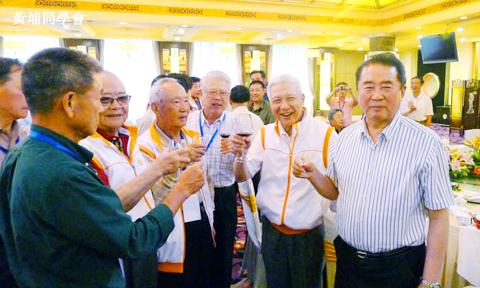Lawmakers across party lines yesterday lashed out at a retired general for allegedly suggesting that the Republic of China (ROC) Army and the People’s Liberation Army (PLA) be called “China’s army.”
Taiwanese media, citing a Chinese media report quoting PLA Major General Luo Yuan (羅援), said a Taiwanese speaker recently told a gathering of retired generals from both sides of the Strait in China: “From now on, we should no longer separate the ROC Army and the PLA. We are all China’s army.”
The report identified the speaker as former ROC Air Force General Hsia Ying-chou (夏瀛洲).

Photo: Lo Tien-pin, Taipei Times
The Ministry of National Defense (MND) yesterday issued a statement saying it had checked with Hsia, who said the media report was “not factual.”
The statement said the ministry had never authorized any group or individual to discuss, exchange views or speak with China on its behalf, adding that any comments made by individuals were said in a “private” capacity.
DENIAL
Hsia’s denial did little to appease lawmakers, with the Chinese Nationalist Party (KMT) caucus demanding the resignation of Minister of National Defense Kao Hua-chu (高華柱) and Political Warfare Department Acting Director General Wang Ming-wo (王明我), saying they had “failed to set clear rules on military personnel exchanges with China.”
KMT caucus whip Hsieh Kuo--liang (謝國樑) said the reported comments had “seriously damaged the country’s dignity.”
Although retired generals are not banned from visiting China, the ministry must ensure that their statements and actions in China “meet public expectations,” Kao said.
KMT Legislator Wu Yu-sheng (吳育昇) said Hsia should apologize to the public and the Taiwanese military if the reports were true.
Wu added that statutory rules were needed to ban retired military officers from engaging or attending military-related exchanges or forums in China.
Wang, however, expressed reservations about formally banning cross-strait exchanges of military officers.
“The MND never authorizes any groups to attend these exchange activities,” Wang said.
He added that under current rules, retired military officers are not barred from making statements or attending cross-strait military exchange activities and are not subject to punishment as long as they do not disclose classified information.
Dissatisfied with Wang’s answer, Hsieh said the ministry, including Kao, should be held responsible if it failed to address the problem.
Democratic Progressive Party (DPP) lawmakers questioned whether Hsia should continue receiving pension benefits as mandated by law, which amounts to about NT$170,000 a month.
If the allegations were true, the government should consider whether it is right that the retired general, “a person who wants to be a part of the Chinese army,” deserves to continue receiving money from Taiwanese taxpayers, DPP Legislator Wong Chin-chu (翁金珠) said.
‘TRAITORS’
DPP Legislator Tsai Huang--liang (蔡煌瑯) said retired generals who had traveled to China are “traitors who wished they were communists.”
The DPP caucus said the caucus was also considering amending the law to prevent retired senior officers from imitating the behavior of those retired generals, which they said had “impacted on Taiwan’s security.”
Replying to media questions on the sidelines of an industrial forum in Taipei, Premier Wu Den-yih (吳敦義) said he found Hsia’s alleged remarks unacceptable, adding that they “were inconsistent with the fundamental policy of the Republic of China.”

MAKING WAVES: China’s maritime militia could become a nontraditional threat in war, clogging up shipping lanes to prevent US or Japanese intervention, a report said About 1,900 Chinese ships flying flags of convenience and fishing vessels that participated in China’s military exercises around Taiwan last month and in January last year have been listed for monitoring, Coast Guard Administration (CGA) Deputy Director-General Hsieh Ching-chin (謝慶欽) said yesterday. Following amendments to the Commercial Port Act (商港法) and the Law of Ships (船舶法) last month, the CGA can designate possible berthing areas or deny ports of call for vessels suspected of loitering around areas where undersea cables can be accessed, Oceans Affairs Council Minister Kuan Bi-ling (管碧玲) said. The list of suspected ships, originally 300, had risen to about

DAREDEVIL: Honnold said it had always been a dream of his to climb Taipei 101, while a Netflix producer said the skyscraper was ‘a real icon of this country’ US climber Alex Honnold yesterday took on Taiwan’s tallest building, becoming the first person to scale Taipei 101 without a rope, harness or safety net. Hundreds of spectators gathered at the base of the 101-story skyscraper to watch Honnold, 40, embark on his daredevil feat, which was also broadcast live on Netflix. Dressed in a red T-shirt and yellow custom-made climbing shoes, Honnold swiftly moved up the southeast face of the glass and steel building. At one point, he stepped onto a platform midway up to wave down at fans and onlookers who were taking photos. People watching from inside

Japan’s strategic alliance with the US would collapse if Tokyo were to turn away from a conflict in Taiwan, Japanese Prime Minister Sanae Takaichi said yesterday, but distanced herself from previous comments that suggested a possible military response in such an event. Takaichi expressed her latest views on a nationally broadcast TV program late on Monday, where an opposition party leader criticized her for igniting tensions with China with the earlier remarks. Ties between Japan and China have sunk to the worst level in years after Takaichi said in November that a hypothetical Chinese attack on Taiwan could bring about a Japanese

The WHO ignored early COVID-19 warnings from Taiwan, US Deputy Secretary of Health and Human Services Jim O’Neill said on Friday, as part of justification for Washington withdrawing from the global health body. US Secretary of State Marco Rubio on Thursday said that the US was pulling out of the UN agency, as it failed to fulfill its responsibilities during the COVID-19 pandemic. The WHO “ignored early COVID warnings from Taiwan in 2019 by pretending Taiwan did not exist, O’Neill wrote on X on Friday, Taiwan time. “It ignored rigorous science and promoted lockdowns.” The US will “continue international coordination on infectious